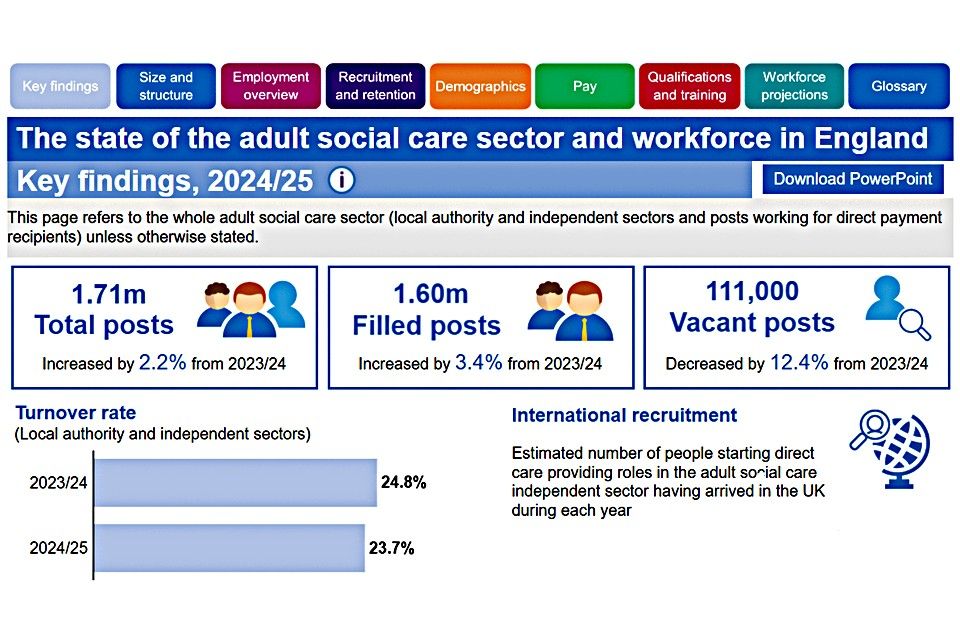
October 15th 2025
Good decisions in adult social care depend on good data. Understanding what’s happening across the workforce – from recruitment and retention to pay, training and demographics – helps providers, local authorities, and national bodies plan for the future, target support, and identify where change is most needed.
Each year, Skills for Care publishes The state of the adult social care sector and workforce in England, the most comprehensive overview of the workforce available. The 2025 report draws on data from the Adult Social Care Workforce Data Set (ASC-WDS), which now covers over half of the CQC-regulated workforce (54.5%). It offers a detailed picture of the sector’s size, structure and trends, helping decision-makers across care to see both the challenges and the opportunities ahead.
Data that drives insight
The 2025 report shows that adult social care remains one of the largest workforces in England, with around 1.6 million filled posts and an estimated economic contribution of £77.8 billion. Vacancy rates have fallen to 7%, down from over 10% in 2021–22, while staff turnover has reduced to 23.1%, the lowest level in recent years.
These figures reveal important signs of stability, but they also highlight the continuing need for action on pay, training and recruitment pathways to sustain improvement.
By analysing year-on-year data, Skills for Care’s workforce intelligence helps to spot emerging trends. For example, international recruitment has played a growing role in filling posts since 2022, contributing to falling vacancies but changing the demographic profile of the workforce. Data also helps to identify risks, such as the high turnover among younger care workers and the relationship between pay, job security and quality ratings. Understanding these relationships enables employers and policymakers to take practical steps to improve retention and the quality of care.
Supporting smarter comparisons and planning
Data doesn’t just show what’s happening within social care – it allows for comparisons with other sectors and between local areas. The report shows that care workers now earn a median hourly rate of £12.00, close to NHS Band 2 pay rates (£12.08) and slightly below Band 3 (£12.31), but with limited room for progression within roles. This insight helps employers and local commissioners understand how competitive the sector is in local labour markets and plan recruitment strategies accordingly.
At regional and local levels, Skills for Care’s online data visualisations enable Integrated Care Boards, local authorities and care associations to examine patterns in employment, turnover and pay in their own areas. These insights can inform workforce strategies, identify skills gaps and shape local training and development offers.
Turning information into action
Data is only valuable when it leads to action. As Michelle Corrigan, Programme Director at Better Security, Better Care, explains:
“Collecting data is only the start. The real value comes when we analyse it and connect the dots – bringing workforce intelligence together with CQC ratings, DSPT progress, digital adoption data and ADASS surveys. That’s how we see the whole picture of what’s happening in care, not just fragments of it. It’s making me think, isn’t it time we had a social care data observatory to bring all of this together and turn numbers into insight that everyone can use?”
That principle applies at every level of social care – from small providers reviewing staff training and sickness data to national policymakers designing recruitment campaigns. Used thoughtfully, data can help leaders understand where investment has the most impact and where new approaches are needed.
A shared responsibility
Everyone in adult social care has a role in ensuring that data collected is accurate and up to date. By maintaining records in the ASC-WDS, providers contribute to a clearer picture of the sector and benefit from benchmarking tools that show how their workforce compares locally and nationally.
In a sector that’s constantly evolving, data remains one of our strongest tools for improvement. The more we use it intelligently – to learn, plan and act – the stronger and more sustainable adult social care becomes. And as Michelle Corrigan’s challenge suggests, perhaps the next step is a shared social care data observatory – a space where insight, not just information, can shape the future of care.
Find out more
Access Skills for Care (2025): The state of the adult social care sector and workforce in England
Join our forthcoming Ctrl+Care Podcast featuring Kate Gore from Skills for Care as we discuss the report and the use of data in more detail. Subscribe on YouTube or Spotify
Check out Skills for Care’s Data Drives Change spotlight.
View all News